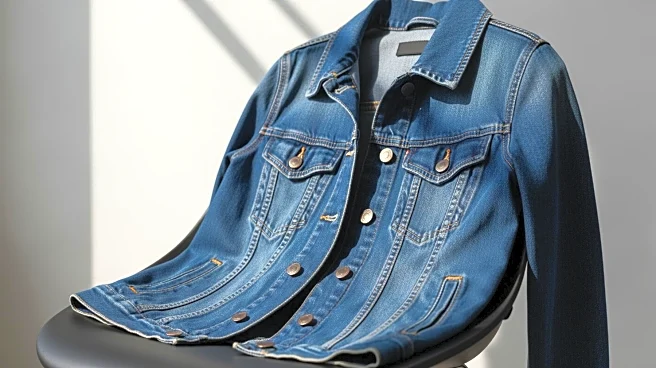What's Happening?
Sydney Sweeney has publicly addressed the controversy surrounding her American Eagle jeans advertisement, which previously sparked debate over its perceived promotion of eugenics. In a recent video interview
with GQ, Sweeney discussed the backlash and the response from President Trump, who had commented on the ad. Despite attempts by GQ's Katherine Stoeffel to engage Sweeney on the sensitive topic of genetic superiority, the actress refrained from apologizing or directly addressing the criticisms. Sweeney expressed surprise at the reaction to the ad, emphasizing her personal love for jeans and her daily attire choices. Her comments have elicited mixed reactions from the public, with some accusing her of being dismissive and privileged.
Why It's Important?
The controversy surrounding Sydney Sweeney's jeans ad highlights ongoing societal debates about race, privilege, and the influence of advertising. The public's reaction to Sweeney's comments underscores the sensitivity of issues related to perceived racial superiority and the responsibilities of public figures in addressing such topics. The incident also reflects the broader impact of celebrity endorsements and the scrutiny they face in the digital age. As public figures navigate these complex issues, their responses can influence public discourse and shape perceptions of social responsibility and awareness.
What's Next?
The renewed attention on Sydney Sweeney's comments may prompt further discussions about the role of celebrities in addressing controversial topics. Stakeholders, including advertisers and public figures, may need to consider more carefully the implications of their endorsements and public statements. The situation could lead to increased pressure on Sweeney to clarify her stance or engage more directly with the criticisms. Additionally, the public's reaction may influence future advertising strategies and the selection of spokespersons for major brands.
Beyond the Headlines
The controversy surrounding Sydney Sweeney's jeans ad raises questions about the ethical responsibilities of celebrities in advertising. It highlights the potential for advertisements to inadvertently perpetuate harmful stereotypes or ideologies. The incident may also contribute to broader discussions about the intersection of race, privilege, and media representation, encouraging more thoughtful consideration of these issues in the entertainment industry.








